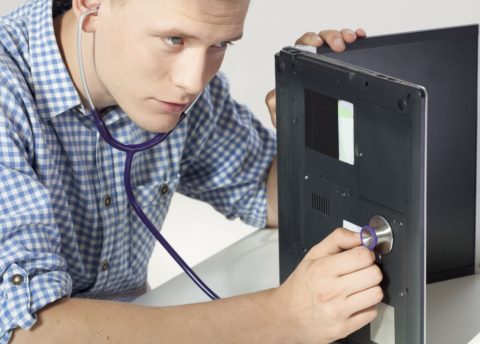
The Secret Writings of a Junior Doctor.
I recently attended an NHS IT Conference – it was about Innovation, new technology, a paperless service and digital technology. They all are right, but the thing that struck me was how everything looked the same as it always has. Vendors displayed their latest versions of tried and tested (old and outdated) software and it all looked just a little bit different from what I saw last year, and the year before. There is a slow evolution going on, like a mountain range moving over eons, while the consumer led revolution that is happening outside seems to have passed the NHS by. How many times do I have to hear “our nurses can’t use technology…”
Now some readers at this point will refer to the examples of Virtual Reality headsets being used for stroke rehabilitation, Augmented Reality for training doctors and the truly amazing work of robotic surgery and they would be right, but this simply highlights the IT Bi-polar disorder that the NHS suffers from.
On the one hand, the NHS leads the world in innovation and has been at the forefront of medical research since its inception.
On the other hand, we have PAS systems, EPRs and EMRs that vehemently uphold the zeitgeist of functioning as no more than a giant unstructured database.
These systems suit certain administrators and select members of non-clinical staff and historically, this was fine, as these were the only users interacting with the systems.
Now, however, we see a dramatic shift in the role of IT within the hospital. Unfortunately, this change in function has not translated into a change in functionality.
So back to the title, what do Millennials expect from IT and work? Millennials are reshaping expectations from IT departments and if they don’t get what they believe is a basic human right, they will leave and that is a major issue for an NHS that is already facing drastic staff shortages.
A generation who have known mobile technology all their life are being served by the very people who tell me their staff can’t use mobile devices and new technology.
As much as us millennials hate to admit it, millennial technology is not just for millennials anymore. More mature generations are embracing it in every aspect of their daily lives. The fact that we all, regardless of age, carry smartphones in our pockets when we enter the hospital just accentuates the dichotomy that exists between IT use in and outside our hospitals.
Let’s consider Helen. She’s a highly experienced, dedicated nurse of 30 years. Last night, Helen used her iPad to book her latest well-earned holiday using her credit card. On her way into work this morning she paid for her coffee using her smartphone. After that, she quickly did some internet banking, where she verified her identity with fingerprint technology. As she changed in the changing room, she shared her bank details with her sister who owes her a few quid from last week.
Helen sits down at her desk in the Nurse’s station, and is met with an antiquated, outdated user interface that doesn’t meet her needs. Her patient’s care is siloed and she’s completely cut-off from surrounding hospitals and departments. She and her team resort to paper to fill the gaps produced by the system her managers claim she wouldn’t be able to work without.
Ask Helen to recall a case of patient safety concern caused by lack of data sharing, and she’ll have a plethora from which to choose. Her clinical experience is littered with cases where better communication between clinical staff could have improved patient care.
Now ask Helen to recall a case where a patient was put at risk because their physicians communicated with each other too easily, too freely, and with too much fluidity.
There are none.
We live in a consumer led technological revolution. Some of you might be old enough to remember that you got the best gadgets and tech at work, (remember the Blackberry RIM 850?) and personal computing at home was slow, expensive and tied to a cable in the wall.
Now in many industries, the NHS being a case in point, it’s like you watch Colour TV at home and come to work and watch Black & White (Yes TV used to be in Black and White!). There are pockets of great innovation and ideas in the NHS and Doctors love to write Apps, but they often fail to gain widespread uptake and adoption and that is a shame, so we need to look to the wider world and what drives consumer uptake, one word – Usability!
So how do we change this? How do we attract and retain the Doctors and Nurses we need for the future? Caring people enter the profession as a vocation but increasing numbers are leaving when the reality bites. Consumer led, mobile first technology has changed the world and the NHS needs to catch up – it needs to put the needs of its staff at the heart of what it does and given the tools and time they will put patients first; that is the nature of the vocation these people have. Put Millennials on your Board, in your IT Departments and listen to what they need, don’t pretend to tell them what they can have – that is not how the world of Millennials works – if they want a taxi, a pizza, to transfer money, buy cinema tickets, anything… it’s all just a fingerprint scan and a click away.
Writer – Business Development Team


